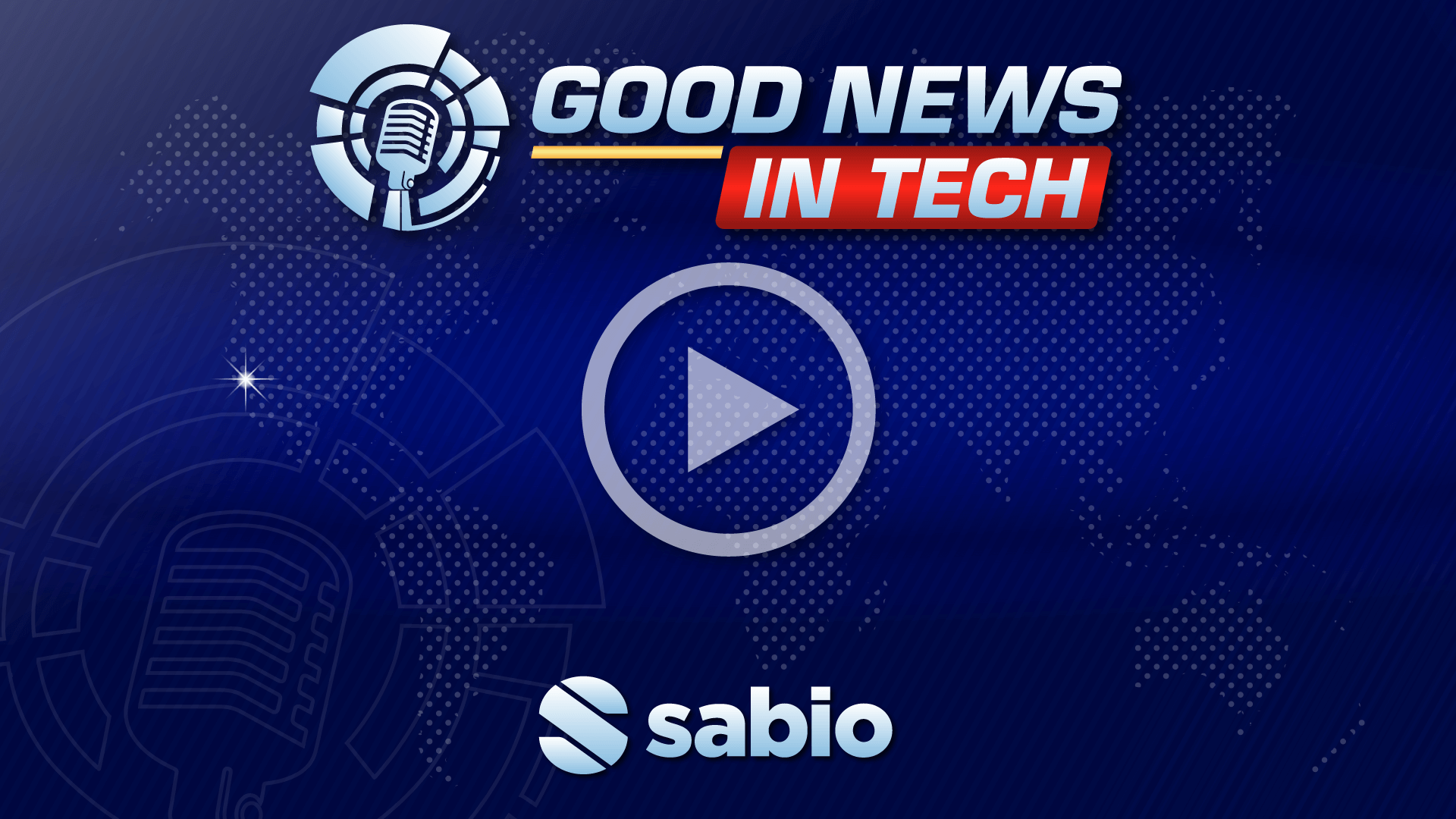Now Reading
Good News in Tech: From student to CTO, Cybersecurity, and more
Monday, April 29, 2024
More from Sabio
Good News in Tech: From student to CTO, Cybersecurity, and more!.
Good News in Tech: From student to CTO, Cybersecurity, and more!.
Okay, let me see. And I'm gonna go, I'm gonna go live on YouTube too, because I can. Wonderful, wonderful. Do we have an agenda? No, we're just gonna talk, we're going to talk about the good news in tech. Hold on a second. I have to wait and see for good news in tech. Oh, click to join. So I guess it is on right now. Uh, that will start soon. Wait for the host. Okay. Here, can you look at, um, you don't have to do you have two screens? Yes. I'm gonna send you two screens. I'm gonna send you this link. You, you watch the YouTube one? I'm gonna watch the LinkedIn one. Okay. Which 1:00 AM I assigned to? YouTube. Okay. Yeah. Okay. So I think, actually, I think we're live here. So watch this. Let's see. Here we go. Center stream. What's up? I love that. I love that. I think I should be, I think we should be going. I don't see our faces. It's coming in. It's coming. It's a little delayed. It's a little delayed. Oh, wonderful. Wonderful. So are we, you can see this. Okay. There we go. There we go. You see? Okay. So we're live. Thank you Liliana, for joining me, for our first live broadcast of the Good News in tech. Thank you very much. Appreciate it. And, um, I think, you know, you've seen my shows here before my videos, you know, the first thing I do is I encourage everybody to share. I don't have my little flying things coming in here. It's my first time going live with this studio. But you wanna encourage everybody to share this news with everybody, right? Share, retweet, repost, put a comment in it, uh, and share it with everybody who's looking for work. And so, Yeah, definitely What we're here to talk about. Did you see, uh, the message, uh, from career services come in a short time ago? Um, yes. We have another person that got a job today, which is really exciting. We also have two other alumni that, um, got promotions and, um, we, there's one person that is now a Chief Technical Officer. So I think it's very important for us to make sure that people understand that yes, you can get a job in tech, which is fantastic, but once you get into the field, there are a lot of opportunities for advancement. And I think that's definitely something, uh, that people should consider when they're thinking about going into a specific career. Um, what does that advancement look like? And so definitely wanna chat about those three things. Okay. And so let's start with, um, the new alumni who recently got a job offer. What I like to go over is some of the high level things that this job, this first of all about the person, right? Because as I refer to them, my good friends, the, the Doom and Gloomers would have us think that it's impossible to get a job unless you have a computer science degree, unless you have experience in tech. And what we're looking at here is someone who does not have any experience whatsoever in tech. In fact, if you look at his profile, like it really, if it wasn't for all the work that we did with him, like it just, this person doesn't look like they should be getting a job in tech. That's not what their background says. And again, as far as the degrees, no degrees. So I'm not saying that they don't have a computer science degree. I'm saying that they don't have any degree visible on their profile. None, right? Absolutely none. And did it take them nine years to get this job? No, it took them, uh, just about, just about two months. That's great. That's fantastic. Two months. So Leanna, I, I, you everybody hears me talk about this every day. Now, what would be, in your words, if I may interview you a little bit, uh, why do you think allowed for that to happen? So, I don't know the specific alum super well, but I would venture to guess that this person was very aggressive with their job hunt. One thing about the SAO program is that during the last part of the program, we do have people start their job hunt and we give them time a, a, a really amazing time block schedule. Um, so, you know, we talk to them. they probably may talk about how they were very aggressive with their job search, um, and also made sure that they stuck to some type of, of time block because you, you know, the human brain really doesn't understand time. And, you know, we have our set ourselves up with this 24 hours and blah, blah, blah, but we can experience 10 minutes or we can experience an hour in the same way. And so that can work to your benefit or it can work to your detriment. And I think one of the great things that you instituted early on was teaching fellows how to time block so that every day in your calendar, there's time for you to apply for jobs, there's time for you to study concepts, and there's time for you to actually code. You have to be doing all of those things in order for you to land a job in tech, all of those things. Correct. Um, and yeah, all of those things that we taught them and they applied it diligently. And here you go. Right? So for me, it's not that, you know, you and I were having a conversation in our office, uh, coffee room, AKA, our kitchen. And again, I mentioned to you like there's people still getting work, people still getting work regardless of whatever's going on. And all the negativity out here, people who are doing the work are still getting the job offers, right? And they're still winning, so that's really great. Yeah. And interviewing, right? Yeah. People are getting interviews, people are getting calls right now. Earlier today, I was helping an alum that needed information about, um, possibly moving to Virginia. They trained with us here in Southern California, but it looks like they, they may be getting far along with an employer in the East Coast. And so, you know, some people are aggressive that way. I know we've seen alum alumni move all over the country, right? So if you are applying for work in your immediate area, fantastic. We tell people to apply for work anywhere because it's good for you to get those interview reps in. And if it ends up happening that you get two job offers and one is for a place where you don't really wanna go, but it's still leverage when you're negotiating the job offer for the place you do wanna go to, right? You can say with a straight face, I have two job offers, you know, I would love to stay here. You know, how can we make that happen? So, um, yeah, there's activity in the job market. Most certainly if anybody follows our SAO social accounts like TikTok or Instagram or LinkedIn. I'm constantly posting what I call amazing opportunities, which are opportunities that are reasonable for people who come from a non-traditional background. And, um, you know, there are times where I, I'm able to find an amazing opportunity daily. So there's definitely activity happening in the marketplace. Okay. Yeah, I agree. Now, Leanna, you said you wanted to talk about, um, the post, uh, from our newly minted, uh, C-T-O-I-I was able to do a screen share here. So why don't you tell us a little bit about this? Yeah. So this is really exciting. So at one point, and right now our, our current SAO logo is code small, dream Big, and you can definitely talk about what that means and why you came up with that. But our old logo before that was, was cultivating tomorrow's CTOs today. And so, uh, Sara Ines, uh, who is in Austin, Texas recently, I think within the past two to three weeks, announced that she is the CTO of a really amazing, uh, company that is developing technology for, um, the legacy business, right? So helping remember family, helping honor, family, helping discover your family tree. And, uh, she posted this really wonderful, uh, summary of how 10 years ago when she, she hadn't even graduated from from Avio yet, she attended a hackathon and she learned some very fundamental concepts, uh, relating to GitHub that she has used in her everyday professional world and life for the, for the following 10 years. And, um, now that she's a CTO, obviously she's had a very productive career in tech. She's worked with a lot of junior developers. and she's always shocked at how some of the junior developers don't have these fundamental concepts that all of our students have. So I think that that's like a double whammy where, you know, some people sometimes are concerned if they come to a coding bootcamp, like, what am I really gonna learn? And I think what people don't understand is that the coding bootcamp here at Sabi was designed to be like laser focused on having you succeed in the job market, um, versus, you know, other programs. And you and I have discussed this many times, other programs, you know, employers, you know, we've had conversations with employers and they're like, can you teach them this? And you can, can you teach them that? And then they don't, you're not even using that on the job. So it, it's really about this fine balance of, of what do you need to learn to be successful in the job, right? It's always nice to know this garbage. Like I know all this garbage about a bunch of stuff, like, but when do I use it? Do I really need it? And, um, I mean, you can talk about that, like why, how was it that, that GitHub, why is it that someone, you know, that worked with, that as a junior developer, didn't have that kind of expertise? Is it like really hard to understand GitHub? Is it, are there commands hidden somewhere? Like what is it? No, it, it's a, uh, it's a factor. Like, so what I hear a lot from other schools and what you read from other people tell you about, um, there, the, the, the git the curriculum and your exposure to get might be like two or three hours on a Tuesday, uh, at some point in time, and I don't know how much, but it's like two or three hours we went over the commands. You did some ex, you know, executed m okay, fantastic. That's nice. But that's not what we do here. Like what we do here is once you get into product development, the product development phase of our training program, which you know, could be, you know, in our full-time program, it's like six to seven, uh, six to seven weeks. So for six to seven weeks, like, it's get, it's like get day after day after day, morning, noon, and night. You know, everyone always shares that little meme of the, the Braveheart, uh, armies colliding for merge. And it's like, and that's what it's like. And so by the time you leave here and including what Sada was sharing, there is, uh, uh, the, uh, little, little cheat sheet of, look, here's the GI commands that we gotta execute here. 'cause we were at a hackathon, and so I had a hackathon, you gotta hurry up and put stuff together and you're just scurrying. She just put a, she put up a little cheat sheet there, took a picture of it so everybody could just look at it conveniently from their, um, from their workstation. And I remember that at Hackathon, I think a bunch of people were there, were dressed in their little onesies. AJ's Yes, I remember that. That was in Santa Monica. Yeah, that was in Santa Monica. I think one of our teams, I think two of our teams placed, right? I think one of our teams had, yeah, Nikki. Yep. Her team. Yep. They did second or first place. Yeah. So that was really exciting. Uh, but that's, that's why like the Git stuff is how am I gonna, so again, I, from coming from industry, how am I gonna send people out into the workforce? And you not knowing how to use Git, you know, at least knowing that you're not scared to jump in there and you're not scared to get yourself into a position where you need to ask a question as opposed to what a lot of people might do is just scared not to even get in there. Right? And so you can, you know, people, we've put up her name, you can look at the, the full posting of, of the information that she so kindly shared, right? The impact that we've had on her, uh, career. And, you know, it's super exciting, super fun to see, um, people being successful, uh, so many years out. Yeah. And I think that's really one of like, just the philosophical differences about, you know, any vocational school, a vocational school, is that the word job? And profession isn't like a dirty word. I mean, because I, I remember at one point in time we had to hire, um, you know, people to help us with pre-work, uh, in person. And we tried hiring a couple people who had graduated from a computer science background, and they just had such a terrible attitude around the concept of like a job and profession. It's like, you know, it's really weird. And I remember just from like, I came from a technical background. I was a bio major. Uh, I went to a four year college and I remember my professors just had like this disdain for like the professional world. Like if you, if you were not gonna go into a master's program, if you were not gonna do a PhD, if you weren't gonna be a doctor, they were just like, Ugh, you're just gonna go be a professional. Like, how dare you, right? Where, and so I think like academia has this really weird relationship with workforce and there's like this kind of like, disconnect. Um, and so there's no disconnect here at sao. It's like you're coming to learn things that you can apply day one that are gonna make sure that you get a job and once you get that job, you stay there. And so that's just like, I don't know, I guess a philosophical difference, but that's what it is here. It's like you're gonna learn things that are going to be applicable in the job day one through, you know, 10 years from now when you're responsible for other people and you're, and you're the CTO. So it's exciting to see that. The other thing that was super exciting, which I received was I got a DM from an alum who graduated two years ago, and they were super excited because their entire compensation package was pretty much, uh, $200,000. And they were really kind to give me details on how that would happen, right? Like, how is it that, How much, $200,000 or total compensation package. And so you, you told me, Hey, ask 'em how that, that's broken down, which is really helpful. Uh, and so the salary of this person is $175,000, which is really exciting. And then they have a $5,000 annual education stipend, which I need to hit them up to see them wanna do cybersecurity with us, uh, because that's around 2,500 bucks. And then they also got, uh, like, I think 10%, uh, matching in their 401k, and they got an annual bonus of $5,000 and a signing bonus of $5,000 for this new position that they, that they went into, um, which is really impressive. And so it's, it's, it's just so wonderful to see that people are able to interview, right? There's interview opportunities, people are interviewing for jobs, people are landing positions in tech, and people are, you know, thriving and are able to reach, you know, really great economic heights of $200,000 or, or more. And or they're able to, you know, become A-A-C-T-O of a tech company, uh, of a tech startup. Um, I think all of those things are really, really, really wonderful to see. And I'm sure in another two weeks when we do this, we'll have some new really cool happenings, um, that our alumni are reporting. And so, did I get that right? I, I figured out I could put my little guy back up here. Two years. She's been, now two years He's been, yep, it's his two year anniversary. Nice. Okay. Yeah, so I put two years, 200,000 up. Yeah, we'll, we'll leave that there. Alright, so I think that, um, you mentioned the cybersecurity program actually. Yes. Talk about cybersecurity before, before we leave, uh, tell us a little bit more about that cybersecurity program. Yeah, so we partnered with CompTIA. They are a global cybersecurity, uh, certification and training program. So on May 1st at 5:30 PM which is a Wednesday, we're gonna kick off our security plus certification program. So cybersecurity basically, um, it's kind of like a, like a data handling, uh, certificate. It teaches you all of the good stuff and all of the bad stuff that you need to be doing if you are in tech to make sure that you don't expose your company to some kind of vulnerability or you don't fall for some kind of phishing attack. Um, so, uh, the interesting thing is that the security plus certification that we're gonna be, uh, working on or teaching is required by the DOD if you're gonna want to, to work in anything that's like government or contracting related. So as we all know, our beloved federal government is spending billions and billions and I think trillions of dollars, uh, every year. A lot of that is, you know, uh, pushed down to subcontractors and to, and to contractors. And so if you wanna work in any of that, you wanna work directly for the federal government, or if you wanna work for a contractor or a subcontractor, it's my understanding that you have to have this security plus CompTIA, uh, certification. And it's a really an amazing value. It's $2,495 investment that is going to allow you to train with us for 10 weeks. We have the most amazing instructor, Antonio, he is certified himself. He's actually teaching at other places, and he's a software engineer. So he has the most amazing experience you could ask for. He's in the day, in the daytime job. He's, he's doing this work and he, he has experience teaching and, um, the investment that you'll make also allows you to be part of the SAO community. So we're gonna help you with your resume writing, all of your interviewing, um, uh, that you're gonna need to go through. And it also includes the money that we have to pay to CompTIA to give you that test so that when you pass, you can add it to your professional profile and you can be Security plus certified. Uh, all of that is done by, by CompTIA because they are the global, the global brand that DOD recognizes. So, uh, give us a call, give me a call, gimme an email. Uh, if you're interested in joining us on May 1st, 5:30 PM PST, uh, you can join from anywhere in the United States. We'd be more than happy to have you. Um, and then once you become a SAO Fellow, if you wanna then do some of the coding stuff, you could do that as well in the evenings and you would receive a discount on that tuition as well. So, um, uh, excited, excited to kick that off. Okay. Well that's, uh, fantastic. I think that covers all the good news that we had. Uh, and then wonderful. And I'll just add though, if cybersecurity is not your thing, we also have the full Stack program, uh, full stack software developer program starting Monday, April 29th. Yes. Right. Uh, yep. Full-Time and Parttime, The bootcamp, the intense bootcamp, what a bootcamp is, we have that running and then the part-time program for those of us that have other obligations, either a daytime schedule or a nighttime schedule might be available. Right, Exactly. Yeah. So lots of, lots of opportunities for you to upskill, reskill. It's something that, you know, that's just, that's just how our life is. We, we always constantly have to be learning things. I know you've, you started to do some cybersecurity stuff. I've done cybersecurity stuff. You had to learn everything with, with ai. Now you're interested in doing some like, vision AI or who knows what else. So there's always an opportunity to learn something, um, like your mom likes to say. What does your mom like to say? Oh man, my mom has a lot of sayings. I don't know what you're talking about. One of her key ones is that, um, learning never ends, which is absolutely true. Yeah, no, I'm, I'm neck deep right now. Uh, my nighttime in, um, vision, computer vision. Fantastic. Yeah, Some fun. That's Awesome. With that going on. Okay, so Leanna, thank you so much. This up. This is fun. I hope we do it again. Another couple weeks. A couple weeks I, next, next, uh, out we get, I'm gonna come back 'cause I like the live ones better. I like, I, I think I like the live one better. We'll see what people think. I think this is gonna get recorded and then we can share it. We'll see what's up. It's the first time I do the live one, so I don't know what the thing's gonna happen, but I, I hope we can do the live ones. I know where to find. Awesome. Thank you so much. Alright, Thank you. And people I'll see soon. Code small, dream big. Let me go with, get that in there. Code small, dream big people.
During our Info Sessions you will learn all about our program, and also get to speak with Sabio team members. In addition, every week you get to hear directly from recent grads that are now thriving in tech.




